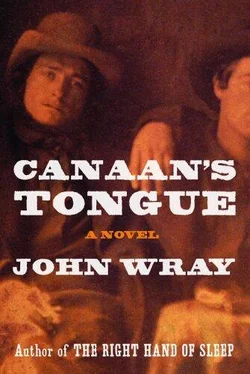“How like a piece of glass it is,” I said. “A fine black aggie.”
“That’s what he keeps me for, miss,” he said, giving me a wink. “I’m his champion marble.”
I kept quiet and let him tell it.
“Once a day the R— sends for me. He takes me somewhere dark, strikes a match, and holds it to my eye. When the match goes out I tell him what I see. I have to tell him straight off, without an instant’s pondering. That’s all. Once I’ve told him he goes off.” Virgil rolled onto his side. “That’s why he always keeps me by.”
I stared at him. “And you believe in that? In what he puzzles out?”
Now his face did a funny turn—; I suppose he was trying to look dignified. “I’m a rationalist, miss,” he said. “I have no faith in witchery.”
But I was more curious about the R—. “The R— tells you nothing?”
“Nothing I can use.” He let out a breath. “I write things down for him—; he never learned to cipher.”
“What sort of things?”
“I’ll be in the whist room tonight,” he said. “Taking the minutes.”
It was my turn to give a crafty look. “So will I.”
“The pox you will!”
“The whist room is my room on Thursdays.”
“The R— asked you?” His hand ran nervously along the coverlet.
“That room is mine on Thursdays, Mr. Ball. Your R— comes here often enough to know.”
But he wasn’t to be quieted. “I wouldn’t think we needed to be waited on, at this particular meeting,” he said in a careful voice.
So he knows more than he tells, I thought to myself. He looks a fool but isn’t.
“The R—’s not declined my services before,” I said.
“He comes here often?” His voice went thick. “He comes to you?”
I smiled. “Why, Aggie? Would you mind?”
He straightened on the bed. “I don’t mind dividing your attentions with — with the rest, ” he said. He rolled over to face the wall. “But I’d prefer— not to share you — with that particular man. I would prefer not to. Uh—”
“You’re nothing but a horse-thief’s opera-glass, Mr. Ball. You’ve no call to dictate anything to anybody. Least of all to me.”
He got up fumblingly from the bed. “You understand me, I see,” he said. His voice was flat and bloodless.
I felt pity for him then. I should have taken that for a sign. I should have known already.
“I’m sure I don’t,” I said. “Not yet.” I held my arms out to him. “Come along back, Aggie, and explain.”
He looked hard at me for a spell. Then he passed a hand over his face and sat down on the bed. We stayed like that a while, listening to the bustle from the street—; I might have fallen into a nap. When I opened my eyes he was watching me like a dog would watch a plate of marrow. A look like that ought to have riled me—; instead it made me feel as light as flax. Another sign. I found that I was pleased to have him by.
“How long have you been with the R—, Aggie?”
He smiled. “How funny that you call him by that name.”
“We call him by whatever name he wants,” I said.
“Yes, miss. So does everybody.”
I laughed. “We get well paid for it.” I gave him a coquettish look. “Can you say the same?”
He only sighed.
“How does the R— make his money? Is it only horses?”
Virgil gave me a thoughtful look. “No,” he said. “Not only horses.”
The skin on the back of my neck prickled in a way that has never done me any good. “What else, then?” I said.
My eyes were closed but I could hear him fumbling for his shirt. “The whist room is yours?” he said.
I nodded. “That’s where I receive my callers. If they don’t ambush me, Aggie, in my private chambers.”
“And you’ll be receiving there tonight.” The bed-springs squeaked as he got up.
I opened my eyes and watched him go. “I will.”
He stood an arm’s-length from the door, buttoning his shirt with slow twists of his thumb. “You’ll have your answer soon enough, then, Clementine.”
IN THE BEGINNING AMERICA WAS EMPTY, God said. There were no horses, God said. There were no cabins, God said. The air was quiet. The land was stupid — there were no noises in it, God said. There were no corn-fields, God said. There were no rice-fields, God said. There were no niggers.
There were no Asas, God said, to own them.
There were no women, God said. There were no horse-flies, God said. There was a quiet all around. There were no steam-boats, God said. There were no skiffs. There were no fathers, God said. There was this quiet, Asa. It was very black.
There were no armies, God said. There were no sparrows, God said. There were no serpents, God said. There were no catfishes in the river. The river was there, but it flowed quiet. The comings and goings were not in it. The air was stupid, God said. There were no sounds in it. It was a dead air, God said. And it was very sweet.
Sweet, I said. Yes! It was very sweet!
Then came the Asas, God said.
I GOT MY ANSWER THAT NIGHT, says Clementine. But not the way Virgil thought I would.
I’d expected a right crowd, what with all the to-do, but the whist room when I came in with my tray of chitterlings and beer held only seven men. I put the tray down on the felt-covered table and sat on a fainting-couch by the door. I recognized Virgil and the rough-neck Stuts Kennedy, who’d come to see me once. The rest were strangers to that house.
The R— was speechifying—:
“A simple proposal, gentlemen, though you may find it hard to picture. It might be best, in beginning, to summarize the commerce in slaves and bondsmen as it functions this day and hour.”
“We know that well enough,” Kennedy said into his scruff.
“I wonder if you do, Mr. Kennedy,” the R— said. He was the same bundle of piss as always, the same little peacock, but no-one else seemed to see it—; and suddenly I found that I couldn’t see it, either. He leaned back in his high-chair, gave an elegant sigh, and set his hands on the table. He might have been Napoleon on campaign.
“The states along the Mason-Dixon,” he said at last, “have a marked glut in man-power—; the lower South, contrary-wise, suffers a desperate lack. For this reason, the slave trade, almost without exception, runs north to south. Although there’s a demand upriver, the few-odd head required are not worth the dealers’ trouble and often as not go unsupplied. In times of need, such slaves are acquired after much trouble and expense downriver in Natchez—; or, even more commonly, here in New Orleans.” He smiled. “This, of course, is why our city has grown so fat.”
He turned as he said this to a pallid-faced man whose eyes were as quick as Virgil’s were quiet. “Not from your sugar plantations, Asa. Though not for want of every good intention.”
“My father poured his blood into this ground,” the man replied. His eyes went from face to face as though he expected to be laughed at. He hushed a moment, hiding under his ruffed black hair, then sputtered out—: “We are all of us Asas tonight, dear sirs! Every one of us in these chambers—”
“To the slaves themselves, however,” the R— interrupted, “nothing could be more dreadful than this fate of being barge-hauled down the river. The death rate on sugar and rice land is exceeding high, and this knowledge has managed to trickle north, with the consequence that most niggers would rather die the same place they were born.”
Kennedy snorted. The R— waited patiently for him to hush.
“And among those that do get shipped, there are more than a few who’d give their last breath for a chance to reverse the above-mentioned flow of trade.”
Читать дальше












